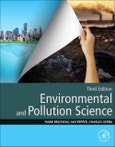Environmental and Pollution Science, Third Edition, continues its tradition on providing readers with the scientific basis to understand, manage, mitigate, and prevent pollution across the environment, be it air, land, or water. Pollution originates from a wide variety of sources, both natural and man-made, and occurs in a wide variety of forms including, biological, chemical, particulate or even energy, making a multivariate approach to assessment and mitigation essential for success. This third edition has been updated and revised to include topics that are critical to addressing pollution issues, from human-health impacts to environmental justice to developing sustainable solutions. Environmental and Pollution Science, Third Edition is designed to give readers the tools to be able to understand and implement multi-disciplinary approaches to help solve current and future environmental pollution problems.
Please Note: This is an On Demand product, delivery may take up to 11 working days after payment has been received.
Table of Contents
PART 1 Fundamental Concepts 1. The Extent of Global Pollution 2. Physical-Chemical Characteristics of Soils and the Subsurface 3. Physical-Chemical Characteristics of Waters 4. Physical-Chemical Characteristics of the Atmosphere 5. Microbial Characteristics of the Environment 6. Ecosystems and Ecosystem Services 7. Physical Processes Affecting Contaminant Transport and Fate 8. Chemical Processes Affecting Contaminant Transport and Fate 9. Biological Processes Affecting Contaminant Transport and Fate
PART 2 Environmental Pollution 10. The Role of Environmental Monitoring in Pollution Science 11. Physical Contaminants 12. Chemical Contaminants 13. Microbial Contaminants 14. Soil and Land Pollution 15. Subsurface Pollution 16. Surface Water Pollution 17. Atmospheric Pollution 18. Urban and Household Pollution
PART 3 Remediation, Restoration, Treatment, and Reuse 19. Soil and Groundwater Remediation 20. Ecosystem Restoration and Land Reclamation 21. Industrial and Municipal Solid Waste Treatment and Disposal 22. Municipal Wastewater Treatment 23. Land Application of Biosolids and Animal Wastes 24. Drinking Water Treatment and Water Security
PART 4 Global Systems and the Human Dimensions to Environmental Pollution 25. Pollution and Environmental Perturbations in the Global System 26. Environmental Human Health 27. Medical Geology and the Soil Health: Human Health Nexus 28. Environmental Toxicology 29. Risk Assessment 30. Environmental Laws and Regulations 31. Environmental Justice 32. Sustainable Development and Other Solutions to Pollution and Global Change 33. Epilogue: Is the Future of Pollution History?








